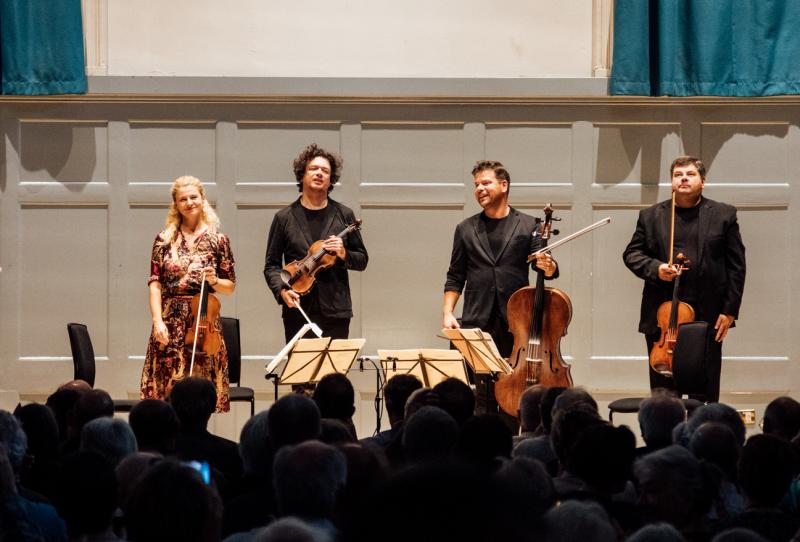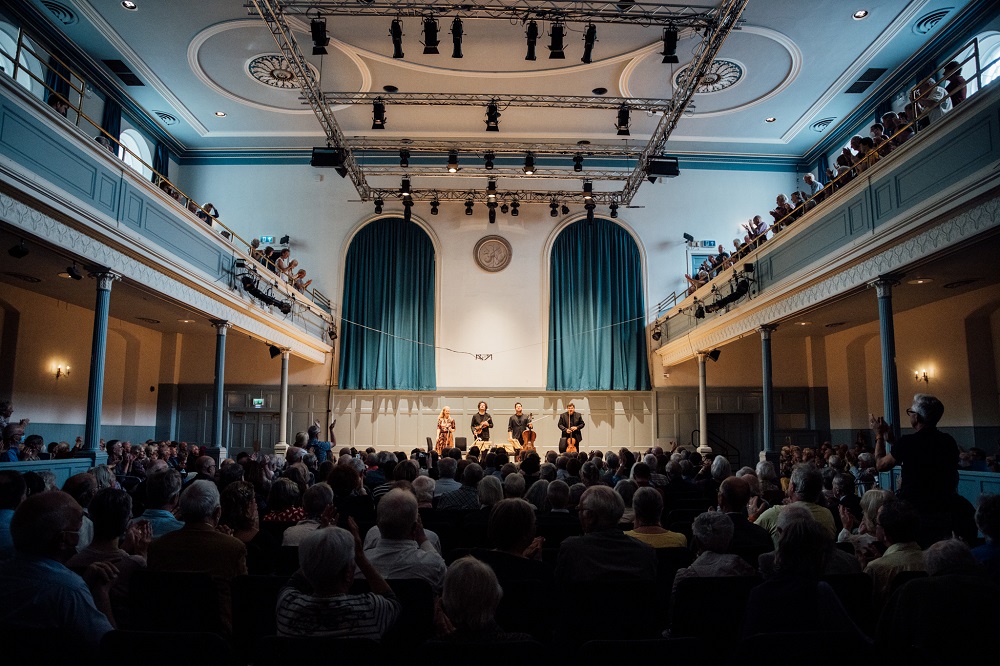Pavel Haas Quartet, Edinburgh International Festival 2022 review - a scorching team on top form | reviews, news & interviews
Pavel Haas Quartet, Edinburgh International Festival 2022 review - a scorching team on top form
Pavel Haas Quartet, Edinburgh International Festival 2022 review - a scorching team on top form
Balance and energy in Haydn, Martinů and Schubert

This is the Pavel Haas Quartet’s second visit to a Scottish festival this summer. They were among the stars of the East Neuk Festival at the start of July, and they were every bit as scorching in this Edinburgh International Festival concert.
The keynote was a beautiful sense of balance, be it the balance of the four musicians, or the balance of major and minor in Schubert’s final quartet. In the first of Haydn’s Opus 76 quartets, with which the concert opened, the balance was between seriousness and fun, something evident right from the start where they played Haydn’s opening smile with a breezy sense of line married to a transparent feeling of musical development. They played the gorgeous, hymn-like melody of the slow movement with dark-mahogany tone, and then sounded like they were having enormous fun in the Menuet (they looked like it, too: cellist Peter Jarůšek involuntarily stuck out his tongue as he played).
Haydn’s finale alternated between G minor seriousness and a marvellous feeling of relaxed warmth, something that also fed into their playing of Martinů’s Concerto da Camera. One of Martinů’s most joyful works, its running rhythms and chasing lines of melody sounded like an energetic perpetuum mobile at times, relaxing only in the heartfelt love music of the slow movement.  These, however, were merely the curtain-raiser to a performance of Schubert’s G major quartet that was little short of stunning. They played Schubert’s visionary final quartet like a crackling cloud of nervous energy, with febrile vitality and electric tension lurking just below the surface, but threatening to break out at any moment. Schubert’s first movement alone is one of the greatest things ever written for a string quartet, and here it sounded completely gripping.
These, however, were merely the curtain-raiser to a performance of Schubert’s G major quartet that was little short of stunning. They played Schubert’s visionary final quartet like a crackling cloud of nervous energy, with febrile vitality and electric tension lurking just below the surface, but threatening to break out at any moment. Schubert’s first movement alone is one of the greatest things ever written for a string quartet, and here it sounded completely gripping.
The battle between G major and G minor was a key part of the drama, but by no means all of it. This whole performance felt like an intensely powerful struggle, perhaps most obviously in the slow movement where the cello’s poignant melody is repeatedly threatened by dangerous tremolos, and seems only just to survive. The scherzo moved forwards with feverish nervous energy, and the finale seemed to spiral through a host of contradictory states before finally, not entirely convincingly, settling into G major.
These musicians are at the very top of their form: their playing is virtuosic, their tone is sensational, and they listen to one another as though their lives depend on it. In short, wonderful.
rating
Share this article
The future of Arts Journalism
You can stop theartsdesk.com closing!
We urgently need financing to survive. Our fundraising drive has thus far raised £49,000 but we need to reach £100,000 or we will be forced to close. Please contribute here: https://gofund.me/c3f6033d
And if you can forward this information to anyone who might assist, we’d be grateful.

Subscribe to theartsdesk.com
Thank you for continuing to read our work on theartsdesk.com. For unlimited access to every article in its entirety, including our archive of more than 15,000 pieces, we're asking for £5 per month or £40 per year. We feel it's a very good deal, and hope you do too.
To take a subscription now simply click here.
And if you're looking for that extra gift for a friend or family member, why not treat them to a theartsdesk.com gift subscription?
more Classical music
 Kilsby, Parkes, Sinfonia of London, Wilson, Barbican review - string things zing and sing in expert hands
British masterpieces for strings plus other-worldly tenor and horn - and a muscular rarity
Kilsby, Parkes, Sinfonia of London, Wilson, Barbican review - string things zing and sing in expert hands
British masterpieces for strings plus other-worldly tenor and horn - and a muscular rarity
 From Historical to Hip-Hop, Classically Black Music Festival, Kings Place review - a cluster of impressive stars for the future
From quasi-Mozartian elegance to the gritty humour of a kitchen inspection
From Historical to Hip-Hop, Classically Black Music Festival, Kings Place review - a cluster of impressive stars for the future
From quasi-Mozartian elegance to the gritty humour of a kitchen inspection
 Shibe, LSO, Adès, Barbican review - gaudy and glorious new music alongside serene Sibelius
Adès’s passion makes persuasive case for the music he loves, both new and old
Shibe, LSO, Adès, Barbican review - gaudy and glorious new music alongside serene Sibelius
Adès’s passion makes persuasive case for the music he loves, both new and old
 Anja Mittermüller, Richard Fu, Wigmore Hall review - a glorious hall debut
The Austrian mezzo shines - at the age of 22
Anja Mittermüller, Richard Fu, Wigmore Hall review - a glorious hall debut
The Austrian mezzo shines - at the age of 22
 First Person: clarinettist Oliver Pashley on the new horizons of The Hermes Experiment's latest album
Compositions by members of this unusual quartet feature for the first time
First Person: clarinettist Oliver Pashley on the new horizons of The Hermes Experiment's latest album
Compositions by members of this unusual quartet feature for the first time
 Gesualdo Passione, Les Arts Florissants, Amala Dior Company, Barbican review - inspired collaboration excavates the music's humanity
At times it was like watching an anarchic religious procession
Gesualdo Passione, Les Arts Florissants, Amala Dior Company, Barbican review - inspired collaboration excavates the music's humanity
At times it was like watching an anarchic religious procession
 Classical CDs: Camels, concrete and cabaret
An influential American composer's 90th birthday box, plus British piano concertos and a father-and-son duo
Classical CDs: Camels, concrete and cabaret
An influential American composer's 90th birthday box, plus British piano concertos and a father-and-son duo
 Cockerham, Manchester Camerata, Sheen, Martin Harris Centre, Manchester review - re-enacting the dawn of modernism
Two UK premieres added to three miniatures from a seminal event of January 1914
Cockerham, Manchester Camerata, Sheen, Martin Harris Centre, Manchester review - re-enacting the dawn of modernism
Two UK premieres added to three miniatures from a seminal event of January 1914
 Kempf, Brno Philharmonic, Davies, Bridgewater Hall, Manchester review - European tradition meets American jazz
Bouncing Czechs enjoy their Gershwin and Brubeck alongside Janáček and Dvořák
Kempf, Brno Philharmonic, Davies, Bridgewater Hall, Manchester review - European tradition meets American jazz
Bouncing Czechs enjoy their Gershwin and Brubeck alongside Janáček and Dvořák
 Solomon, OAE, Butt, QEH review - daft Biblical whitewashing with great choruses
Even a top soprano and mezzo can’t make this Handel paean wholly convincing
Solomon, OAE, Butt, QEH review - daft Biblical whitewashing with great choruses
Even a top soprano and mezzo can’t make this Handel paean wholly convincing
 Two-Piano Gala, Kings Place review - shining constellations
London Piano Festival curators and illustrious friends entertain and enlighten
Two-Piano Gala, Kings Place review - shining constellations
London Piano Festival curators and illustrious friends entertain and enlighten
 Echo Vocal Ensemble, Latto, Union Chapel review - eclectic choral programme garlanded with dance
Beautiful singing at the heart of an imaginative and stylistically varied concert
Echo Vocal Ensemble, Latto, Union Chapel review - eclectic choral programme garlanded with dance
Beautiful singing at the heart of an imaginative and stylistically varied concert

Add comment